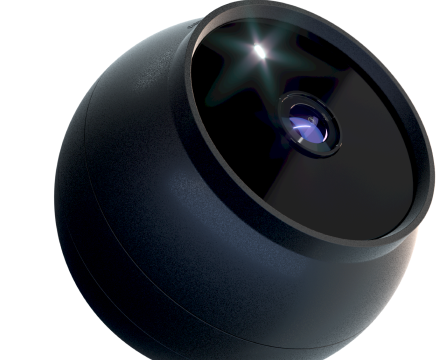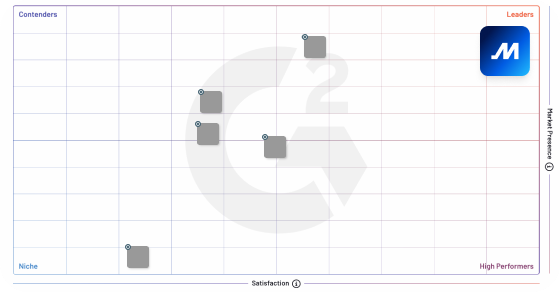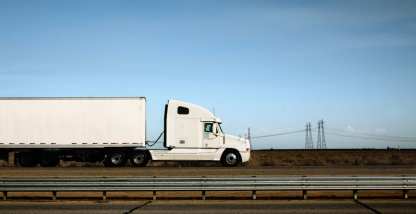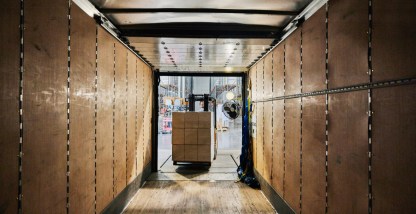Transporting perishable goods is big business. Perishable goods make up many of the items consumers purchase regularly, like food products, pharmaceuticals, flowers, candles, paint, and chewing gum. These types of goods are categorized as reefer freight, meaning they require refrigeration because they have the potential to spoil or damage at high temperatures.
To maintain the low temperatures needed to transport perishable goods, fleets use reefer trailers.
What is a reefer trailer?
A reefer trailer is insulated and contains a refrigeration unit in order to maintain temperature control for items that require low temperatures. Reefer trailers can be up to 53 feet long but do also come in a variety of sizes.
Companies rely on reefer trailers to transport perishable goods. In addition to the prevention of spoiled or damaged goods, certain perishable goods, like human and animal food, are under federal regulations when it comes to the temperature at which they must be stored.
The Sanitary Transportation of Human and Animal Food, cited in the FSMA mandate, affects companies involved in the transportation of temperature-controlled foods, including shippers, carriers, loaders, and receivers. These companies must:
- Maintain adequate temperature controls to ensure food safety.
- Retain records of transportation conditions for 12 months.
- Provide the operating temperature to the receiver and demonstrate that it has maintained temperature conditions during the transportation.
Reefer trailer temperature ranges
Reefer trailer temperature ranges depend on the type of perishable cargo being transported. A few of the most common types of perishable cargo and their corresponding temperature ranges are listed below.Pharmaceuticals
The reefer trailer temperature range for pharmaceuticals can be large and must be verified by the product’s manufacturer. Because temperature ranges for pharmaceutical cargo can be different based on the chemical composition of the items, temperature ranges work a bit differently for pharmaceuticals.
A common reefer trailer temperature range breakdown for pharmaceuticals looks like this:
- 20-25˚C for room temperature
- 2-8˚C for refrigerated
- Below 0˚C to as low as -150˚C for cryogenic
Meat, Poultry, Fish, and Dairy
Meat, poultry, fish, and dairy products should be kept in temperatures of 40˚F or lower. These types of meat and dairy products can grow bacteria harmful to those who consume them if they’re not kept at the proper temperature to prevent bacteria growth.
Produce
Like pharmaceuticals, produce is also stored at different temperatures based on the type of produce. Certain product types can cope with higher temperatures better than others. A good example provided by Hale Trailer is that while lettuce will wilt at a higher temperature, citrus and melons can handle warmer conditions better.
According to Hale, these reefer trailer temperature ranges are considered the best for the following types of produce:
- 32-36˚F for greens, berries, apples, cruciferous vegetables, grapes, and stone fruits
- 38-40˚F for avocados and cranberries
- 40-45˚F for potatoes, green beans, and sweet potatoes
- 45-50˚F for watermelon, cucumbers, some citrus, bananas, and tomatoes
Plants and Florals
Plants and other florals are commonly transported using reefer trailers, since these types of goods can wilt or lose freshness when not kept in cooler and more stable temperatures. Most plants and florals are kept at 33˚F.
Benefits of reefer trailer temperature monitoring
Because of factors like global climate change and shifting consumer habits, more and more companies are looking to reefer trailers to transport perishable goods. To maintain the proper and efficient operations in reefer trailers, companies rely on refrigerated truck temperature monitoring.
Three of the main benefits of reefer trailer temperature monitoring are:
- Compliance with the FSMA. Reefer trailers help companies stay compliant with the FSMA mandate, keeping human and animal food items at the temperatures necessary to avoid harmful effects to those consuming them. Reefer tracking technology helps with storing and maintaining temperature logs for the required 12 months after the transportation agreement. Reefer temperature monitoring technology also helps with providing a vehicle’s necessary operating temperatures, demonstrating that it has maintained temperature conditions during the transportation.
- Lower reefer operating costs. Outdated reefer tracking software to monitor reefer units can result in higher costs when it comes to operating reefer trailers. More sophisticated refrigerated truck temperature monitoring allows for more efficiencies in fuel usage and maintenance, as well as the prevention of misuse and overuse. These factors combined can help lower overall costs associated with maintaining reefer trailers.
- Remote reefer controls. One temperature programming error is a costly mistake that could result in damage to freight. Reefer trailer temperature monitoring technology allows for the remote control of reefer temperatures, which helps to avoid errors caused by manual temperature programming by individual drivers. The ability to remotely monitor and control temperature programs helps to maintain accuracy and efficiency.
Tips for effective reefer monitoring
Effective reefer monitoring can mean the difference between damaged or undamaged cargo, increased or decreased profits, and satisfied or unsatisfied customers. Ineffective reefer monitoring practices can also mean non-compliance with federal mandates.
To make sure you’re maintaining effective reefer monitoring practices, it’s helpful to start with making sure you are following the four key requirements of the FSMA mandate:
- Vehicles and transportation equipment. Design and maintain vehicle and transportation equipment to ensure that it doesn’t cause the food that it transports to become unsafe. For example, vehicles must be suitable and adequately clean for their intended use and capable of maintaining temperatures necessary for the safe transport of food.
- Transportation operations. Take measures during transportation to ensure food safety, such as adequate temperature controls, preventing contamination of ready-to-eat food from touching raw food, protection of food from contamination by non-food items in the same load or previous load, and protection of food from cross-contact, i.e., the unintentional incorporation of a food allergen.
- Training. Train carrier personnel in sanitary transportation practices and documentation of the training. Carriers covered by the rule are required to provide food safety training to transportation operations personnel when the carrier and shipper agree that the carrier is responsible for sanitary conditions during transport. Learn more in this FDA Training Module.
- Records. Maintain records of written procedures, agreements, and training (required of carriers). The required retention time for these records depends upon the type of record and when the covered activity occurred, but does not exceed 12 months.
How to choose the right reefer monitoring system
To maximize the benefits you can get from your reefer temperature tracking system, make sure you choose a system with the capabilities to help you comply with FSMA regulations, lower the cost of your reefer operations, and reduce reefer programming errors. You’ll want a reefer temperature tracking system with features such as:
- Temperature log access. The right reefer monitoring system will give you full access to your temperature logs to view in real time and the ability to export logs with historical temperature data.
- Complete dashboard. You need a reefer temperature tracking system with a complete dashboard that shows real-time environmental data alongside driver and vehicle insights.
- Environmental sensor. A reefer monitoring system needs environmental sensors that support multi-temperature zones within reefer trailers that can be placed anywhere in a trailer to capture humidity and temperature levels.
- Remote control capabilities. Make sure your reefer monitoring system has remote control capabilities so you can minimize costly errors and save drivers time by remote controlling reefer units.
The Motive Reefer Monitoring solution
Motive Reefer Monitoring improves the compliance, profitability, and productivity of businesses by centralizing the management of reefer trailer fleets. Our Thermo King Integration helps you analyze live and historical telematics like fuel use, fault codes, and reefer telematics to proactively address any issues.
Learn more about the difference Motive Reefer Monitoring can make in your reefer trailer operations. Contact us today.










